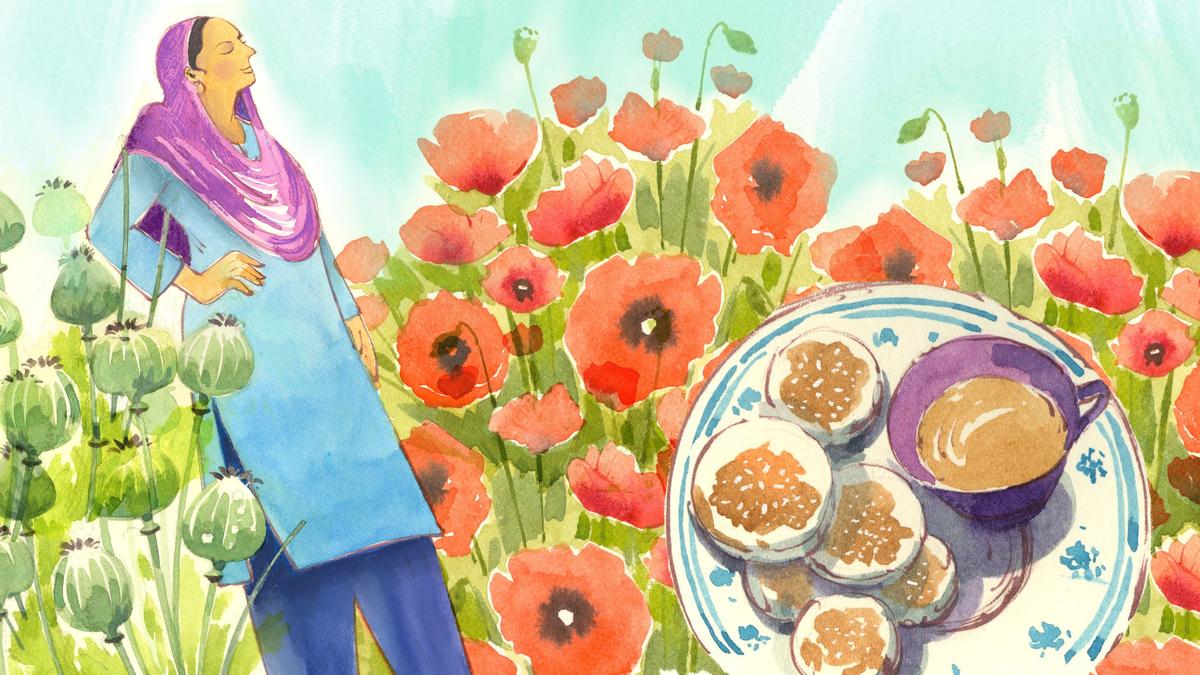On a beautiful spring day in April, a young woman walked into Phuphee’s garden. We had been tending to her garden since the early hours of the morning despite there having been a light shower. Phuphee was planting bulbs for lilies and freesias, which she hoped would bloom later on in the summer.
When she was done, she stood over the flower beds and uttered a prayer, blowing over them repeatedly, invoking God to bless her with blooms. As soon as she spotted the young woman, she instructed one of the helpers to bring some kahwa and kandi kulchas (a chunky, sweet biscuit-like snack sprinkled with poppy seeds).
She greeted the woman and invited her to follow her into her room. I waited, hoping she would ask me to join them but she didn’t. An hour later they came onto the verandah, the young woman’s eyes red rimmed and her kohl smeared, but she didn’t look sad. I saw Phuphee rest her hand on the woman’s arm and whisper, ‘Hemath [strength]’. She smiled and left.
A few days later I understood why the young woman had come over, and why Phuphee hadn’t invited me in. The woman, whose name was Zeenat, had caused an uproar in the district of Shopian. She had done the unthinkable: she had asked for a khula [divorce that is initiated by a woman] on the grounds that her husband was unable to carry out any intimate conjugal duties.

Zeenat had been married for over two years, and had waited patiently for her husband to agree to seek further medical help. But he along with his family had flatly refused. As they put it, ‘It wasn’t possible for there to be anything wrong with their son’, despite Zeenat repeatedly showing them test results that proved otherwise. The in-laws put the blame squarely on her shoulders.
She had been trying to convince him to see a specialist but he had refused saying, ‘If it was God’s will, it would happen.’ Upon hearing this, she had become frustrated and lost her temper. She had packed up her belongings and gone back to her maternal home in the next village. A week later she had sent a village elder to her husband’s house asking for a khula. It had been a few months since then, and though her husband hadn’t yet agreed to the khula, the rest of the district hadn’t stopped talking about her. The elders called her an abomination, a harbinger of doom and the downfall of morality; the men spoke of her as a fallen woman; and the women called her vile and shameless. She was shunned by all polite society.
At the time, I was barely 20 and I could not understand why everyone seemed so angry with Zeenat. So, I asked Phuphee.
‘Well for one, it is not acceptable for a woman to have desires. And then for a woman to express it so explicitly is unheard of. To top it all off, because she has been unable to fulfil her desire, she has decided to do something about it. But I guess the biggest offence is that she is absolutely aware of and sure of herself. I mean a woman who knows what she wants and how to get it? It doesn’t get any more offensive than that,’ Phuphee replied, smoking her two cigarettes a little more intensely than usual.
I couldn’t work out from her tone if she was cross with Zeenat or in awe of her. I suspected the latter. We had been sitting on her verandah having nun chai and kandi kulchas. I sat there trying to work out what she meant — that it was unacceptable for a woman to have desires or to express them explicitly.

I waited for Phuphee to say something further, but she was lost in her own thoughts. She kept smoking, sipping her kahwa, and nibbling away at her kulcha until it was gone. When she was done with all three, she said she was going to say her prayers.
She turned around at the door and before disappearing into the dark corridor, said, ‘Myoan gaash [light of my eyes], the poppy plant is a wondrous and fragile thing, easy to destroy, beautiful to look at, and gives us khash khaash [poppy seeds] and afeem [opium], a substance both deadly and useful — with the ability to destroy or treat. You know, I always wonder if the poppy is self-aware. Does it know its own power or is it clueless?’
When she had gone inside, I thought about what she had just said. Her words induced an anxiety within me, but I knew enough of Phuphee to know that the antidote wouldn’t be far and I relaxed. With every passing day I realised that among other things, her words were a warning and a reminder — a warning about the possible challenges coming my way, and a reminder that within me lay power which, if harnessed, could do wondrous things. Just like Zeenat’s power had done.
Saba Mahjoor, a Kashmiri living in England, spends her scant free time contemplating life’s vagaries.
Published – August 30, 2025 06:06 am IST
